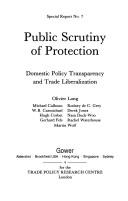| Listing 1 - 10 of 85 | << page >> |
Sort by
|
Book
ISBN: 1400878659 0691092184 0691627738 9781400878659 9780691627731 Year: 2015 Publisher: Princeton, NJ
Abstract | Keywords | Export | Availability | Bookmark
 Loading...
Loading...Choose an application
- Reference Manager
- EndNote
- RefWorks (Direct export to RefWorks)
Contents Foreword, ixI. Introductory, 1 II. The Nature of Protection, 8 III. Critique of Popular, and Fallacious, Arguments for Protection, 17 IV. The Argument for Free Trade, 50 V. Rational Protection, 63 VI. Anti-dumping Legislation and Special Forms of Foreign Trade Control, 89 VII. The Future Commercial Policy of the United States, 107 Appendix I, 134 Appendix II, 150 Originally published in 1942.The Princeton Legacy Library uses the latest print-on-demand technology to again make available previously out-of-print books from the distinguished backlist of Princeton University Press. These editions preserve the original texts of these important books while presenting them in durable paperback and hardcover editions. The goal of the Princeton Legacy Library is to vastly increase access to the rich scholarly heritage found in the thousands of books published by Princeton University Press since its founding in 1905.
Protectionism. --- Tariff --- Free trade and protection --- Protectionism --- Commercial policy
Book
ISBN: 9781783081554 9781783081844 1783081848 1322221359 9781322221359 1783081554 Year: 2014 Publisher: London Anthem Press
Abstract | Keywords | Export | Availability | Bookmark
 Loading...
Loading...Choose an application
- Reference Manager
- EndNote
- RefWorks (Direct export to RefWorks)
Mathew Carey was one of the most popular and influential economic writers of his day, but his work has been largely overlooked by modern writers, who tend to focus on more scholarly writers or on precursors to contemporary classical economics. Carey was a self-taught printer and publisher who rejected Adam Smith, led the early fight for protective tariffs, and wrote hundreds of newspaper articles to convince the public of the need to protect American manufacturers. 'The New Olive Branch' is Carey's most important, accessible, and sustained elaboration of his political-economic ideas, and is accompanied in this volume by portions of his 'Addresses of the Philadelphia Society for the Promotion of National Industry' (1822), which offer further insight into his rejection of classical economics.
Tariff --- Free trade --- Protectionism --- E-books
Book
ISBN: 1526154145 9781526154149 9781526154156 1526154153 1526154129 9781526154125 9781526154132 1526154137 Year: 2021 Publisher: [Manchester]
Abstract | Keywords | Export | Availability | Bookmark
 Loading...
Loading...Choose an application
- Reference Manager
- EndNote
- RefWorks (Direct export to RefWorks)
This book proposes concrete solutions to confront the populist wave and the rise of "illiberal democracy." The author demonstrates that democracy is not a "demand side" phenomenon, but rather a "supply side" phenomenon and formulates twenty original and bold proposals to fight populism and defend liberal democracy. An original and essential book which will undoubtedly stimulate vigorous debate.
Populism. --- Direct democracy. --- Identity politics. --- Protectionism.
Book
ISBN: 3789011304 Year: 1985 Publisher: Baden-Baden
Abstract | Keywords | Export | Availability | Bookmark
 Loading...
Loading...Choose an application
- Reference Manager
- EndNote
- RefWorks (Direct export to RefWorks)
Macroeconomics --- Trade theory --- Economic law --- Protectionism --- Congresses. --- Congresses

ISBN: 0566057808 9780566057809 Year: 1989 Volume: 7 Publisher: Aldershot, Hampshire, U.K.,Brookefield, USA : Gower for the Trade Policy Research Centre, London,
Abstract | Keywords | Export | Availability | Bookmark
 Loading...
Loading...Choose an application
- Reference Manager
- EndNote
- RefWorks (Direct export to RefWorks)
Commercial policy --- Free trade --- International trade --- Protectionism --- Politique commerciale --- Libre-échange --- Commerce international --- Protectionnisme --- Free trade. --- Protectionism. --- Commercial policy. --- International trade. --- Libre-échange
Book
ISBN: 0691056706 Year: 1988 Publisher: Princeton, N.J. Princeton University Press
Abstract | Keywords | Export | Availability | Bookmark
 Loading...
Loading...Choose an application
- Reference Manager
- EndNote
- RefWorks (Direct export to RefWorks)
Foreign trade policy --- Free trade --- International business enterprises. --- International trade. --- Protectionism --- Tariff --- Case studies.
Book
ISBN: 0802051782 1442638001 1442653477 9781442653474 9781442638006 9780802051783 Year: 1966 Publisher: Toronto
Abstract | Keywords | Export | Availability | Bookmark
 Loading...
Loading...Choose an application
- Reference Manager
- EndNote
- RefWorks (Direct export to RefWorks)
Canadian historians have always looks favourably on Macdonald's national policies, including the protective tariff. On the other hand, the canons of economic theory have little or nothing to say in favour of protection. Professor Dales attempts in these essays to bridge this gap between trade theory and the standard interpretation of Canadian development. In the first three essays he is concerned with relaxing the rigorous assumptions of labour and capital immobility that characterize theoretical writings on international trade in order to make them more applicable to Canada, for it must be recognized that large movements of labour and capital both into and out of the country have been one of the most important features of the Canadian economy today. The next three chapters discuss the probable historical effects of Canadian protection in the light of the modified theory. Professor Dales makes statistical comparisons between the economic development of Canada and the United States in order to identify the main differences between the patterns of economic growth in the two countries and to throw light on the large and persistent gap between the Canadian and American standards of living. The last two essays are in the nature of provocative "squibs" designed to break up some of the hard-core conventional wisdom about the Canadian economy. Although free trade versus protection has long been a dormant issue in policy discussions, it never quite disappears from the scene. Professor Dales persists in thinking that free trade-with all countries and unilaterally if necessary-is the best policy for Canada. The controversial issues raised by these essays are of the highest importance not only to historians and economists but to all in any way concerned with the public policies of this country. The book focuses our attention on a basic antinomy of Canadian life and thought that has been little recognized and by its stimulating analysis will help to form the shape of our continuing "nation-alysis."
Tariff --- Protectionism --- Canada --- Commercial policy. --- Free trade and protection --- Commercial policy --- E-books
Book
ISBN: 9780300240078 0300240074 9780300234503 Year: 2018 Publisher: New Haven
Abstract | Keywords | Export | Availability | Bookmark
 Loading...
Loading...Choose an application
- Reference Manager
- EndNote
- RefWorks (Direct export to RefWorks)
A controversial look at the end of globalization and what it means for prosperity, peace, and the global economic order Globalization, long considered the best route to economic prosperity, is not inevitable. An approach built on the principles of free trade and, since the 1980s, open capital markets, is beginning to fracture. With disappointing growth rates across the Western world, nations are no longer willing to sacrifice national interests for global growth; nor are their leaders able-or willing-to sell the idea of pursuing a global agenda of prosperity to their citizens. Combining historical analysis with current affairs, economist Stephen D. King provides a provocative and engaging account of why globalization is being rejected, what a world ruled by rival states with conflicting aims might look like, and how the pursuit of nationalist agendas could result in a race to the bottom. King argues that a rejection of globalization and a return to "autarky" will risk economic and political conflict, and he uses lessons from history to gauge how best to avoid the worst possible outcomes.
E-books --- Anti-globalization movement. --- Globalization --- International economic integration. --- Nationalism --- Protectionism. --- Economic aspects.
Book
ISBN: 022635895X 9780226358956 9780226358789 022635878X 9780226358819 022635881X Year: 2016 Publisher: Chicago London
Abstract | Keywords | Export | Availability | Bookmark
 Loading...
Loading...Choose an application
- Reference Manager
- EndNote
- RefWorks (Direct export to RefWorks)
Since the 1970s, two major trends have emerged among developing countries: the rise of new democracies and the rush to free trade. For some, the confluence of these events suggests that a free-market economy complements a fledgling democracy. Others argue that the two are inherently incompatible and that exposure to economic globalization actually jeopardizes new democracies. Which view is correct? Bumba Mukherjee argues that the reality of how democracy and trade policy unravel in developing countries is more nuanced than either account. Mukherjee offers the first comprehensive cross-national framework for identifying the specific economic conditions that influence trade policy in developing countries. Laying out the causes of variation in trade policy in four developing or recently developed countries-Brazil, India, Indonesia, and South Africa-he argues persuasively that changing political interactions among parties, party leaders, and the labor market are often key to trade policy outcome. For instance, if workers are in a position to benefit from opening up to trade, party leaders in turn support trade reforms by decreasing tariffs and other trade barriers. At a time when discussions about the stability of new democracies are at the forefront, Democracy and Trade Policy in Developing Countries provides invaluable insight into the conditions needed for a democracy to survive in the developing world in the context of globalization.
Protectionism --- Democratization --- Political aspects --- Mathematical models. --- Economic aspects --- Developing countries --- Commercial policy.

ISBN: 0521346614 052134669X 0511571976 0511873298 9780521346696 9780511571978 9780521346610 Year: 1990 Publisher: Cambridge Cambridge University
Abstract | Keywords | Export | Availability | Bookmark
 Loading...
Loading...Choose an application
- Reference Manager
- EndNote
- RefWorks (Direct export to RefWorks)
Over the past two decades there has been a gradual but fundamental change in the nature of trade protection. Even as international negotiation has succeeded in reducing tariffs to low levels, national governments have resorted to a range of increasingly intricate policies to protect their domestic industries from foreign competition. Direct quantitative restrictions on international trade have become particularly widespread. Such nontariff barriers often have very different effects from tariffs and require careful analysis in their own right. This book presents a systematic overview of the modern theory of trade protection. The material in the book divides naturally into four sections. The first section covers trade restrictions in competitive markets, the second trade restrictions and imperfect competition, the third the political economy of trade protection, and the fourth the theory of policy reform. The presentation makes extensive use of diagrams, with the more difficult mathematics included in six appendixes. This approach emphasises microeconomics and makes the book suitable for graduate and advanced undergraduate students in the social sciences who have taken one intermediate microeconomics course.
Foreign trade policy --- Protectionism --- Protectionisme --- Protectionnisme --- Protectionism. --- Business, Economy and Management --- Economics --- protectionnisme --- relations economiques internationales --- 382.32 --- AA / International- internationaal --- Free trade and protection --- Commercial policy --- protectionisme --- internationale economische betrekkingen
| Listing 1 - 10 of 85 | << page >> |
Sort by
|

 Search
Search Feedback
Feedback About UniCat
About UniCat  Help
Help News
News